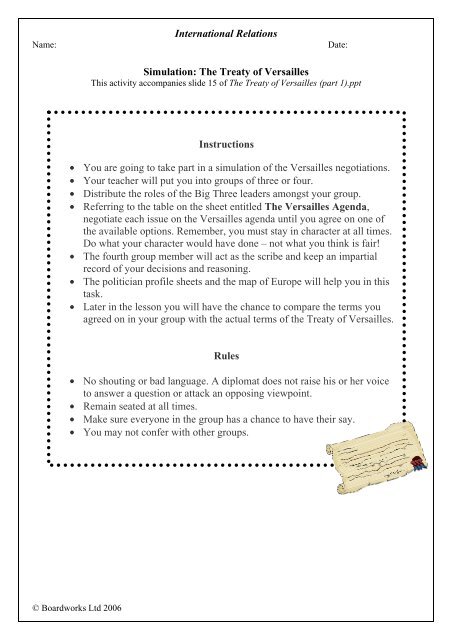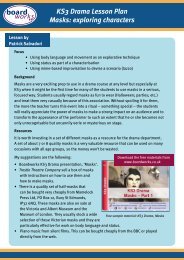4a. The Treaty of Versailles part 1 Worksheets - Boardworks
4a. The Treaty of Versailles part 1 Worksheets - Boardworks
4a. The Treaty of Versailles part 1 Worksheets - Boardworks
Create successful ePaper yourself
Turn your PDF publications into a flip-book with our unique Google optimized e-Paper software.
International Relations<br />
Name: Date:<br />
© <strong>Boardworks</strong> Ltd 2006<br />
Simulation: <strong>The</strong> <strong>Treaty</strong> <strong>of</strong> <strong>Versailles</strong><br />
This activity accompanies slide 15 <strong>of</strong> <strong>The</strong> <strong>Treaty</strong> <strong>of</strong> <strong>Versailles</strong> (<strong>part</strong> 1).ppt<br />
Instructions<br />
• You are going to take <strong>part</strong> in a simulation <strong>of</strong> the <strong>Versailles</strong> negotiations.<br />
• Your teacher will put you into groups <strong>of</strong> three or four.<br />
• Distribute the roles <strong>of</strong> the Big Three leaders amongst your group.<br />
• Referring to the table on the sheet entitled <strong>The</strong> <strong>Versailles</strong> Agenda,<br />
negotiate each issue on the <strong>Versailles</strong> agenda until you agree on one <strong>of</strong><br />
the available options. Remember, you must stay in character at all times.<br />
Do what your character would have done – not what you think is fair!<br />
• <strong>The</strong> fourth group member will act as the scribe and keep an im<strong>part</strong>ial<br />
record <strong>of</strong> your decisions and reasoning.<br />
• <strong>The</strong> politician pr<strong>of</strong>ile sheets and the map <strong>of</strong> Europe will help you in this<br />
task.<br />
• Later in the lesson you will have the chance to compare the terms you<br />
agreed on in your group with the actual terms <strong>of</strong> the <strong>Treaty</strong> <strong>of</strong> <strong>Versailles</strong>.<br />
Rules<br />
• No shouting or bad language. A diplomat does not raise his or her voice<br />
to answer a question or attack an opposing viewpoint.<br />
• Remain seated at all times.<br />
• Make sure everyone in the group has a chance to have their say.<br />
• You may not confer with other groups.
International Relations<br />
Name: Date:<br />
© <strong>Boardworks</strong> Ltd 2006<br />
Pr<strong>of</strong>ile: Woodrow Wilson, President <strong>of</strong> the USA<br />
This fact sheet accompanies slide 15 <strong>of</strong> <strong>The</strong> <strong>Treaty</strong> <strong>of</strong> <strong>Versailles</strong> (<strong>part</strong> 1).ppt<br />
• b. 1856, d. 1924.<br />
• Wilson entered politics in 1910 and was President by 1912.<br />
• He brought the USA into the war in 1917.<br />
Wilson was an idealist and reformer who saw the <strong>Treaty</strong> <strong>of</strong> <strong>Versailles</strong> as an opportunity<br />
to end war forever by binding all countries together in a mutual alliance – the ‘League <strong>of</strong><br />
Nations’.<br />
Wilson came to <strong>Versailles</strong> with a 14 point programme which he hoped would shape<br />
modern international relations.<br />
<strong>The</strong> points were based upon a number <strong>of</strong> principles:<br />
• ending the ‘old world’ diplomacy which had led to war<br />
• establishing self-determination – people should rule themselves rather than being<br />
subject to other nationalities<br />
• Germany should lose all its territorial gains<br />
• disarmament<br />
• restrictions on trade should be abolished.<br />
Wilson was prepared to compromise on some issues so long as the League <strong>of</strong> Nations was<br />
established.
International Relations<br />
Name: Date:<br />
© <strong>Boardworks</strong> Ltd 2006<br />
Pr<strong>of</strong>ile: Georges Clemenceau, President <strong>of</strong> France<br />
This fact sheet accompanies slide 15 <strong>of</strong> <strong>The</strong> <strong>Treaty</strong> <strong>of</strong> <strong>Versailles</strong> (<strong>part</strong> 1).ppt<br />
• b. 1841, d. 1929.<br />
• Clemenceau entered politics in 1871.<br />
• He was President from 1906 to 1909, and was re-elected in 1917.<br />
Clemenceau was nicknamed ‘the tiger’ because <strong>of</strong> his fiery and uncompromising<br />
personality. An old man – 77 at the time <strong>of</strong> the <strong>Treaty</strong> <strong>of</strong> <strong>Versailles</strong> – he had seen his<br />
nation invaded by the Germans twice, first during the Franco-Prussian War <strong>of</strong> 1870–71<br />
and again in 1914.<br />
Clemenceau came to <strong>Versailles</strong> determined to exact vengeance on the German nation. He<br />
wanted to weaken Germany so that it could never threaten France again.<br />
• Clemenceau wanted French troops stationed in the Rhineland to guard against any<br />
future German attack.<br />
• He wanted Germany to return the province <strong>of</strong> Alsace-Lorraine, which had been<br />
captured from France during the Franco-Prussian War.<br />
• He wanted Germany to pay all the costs <strong>of</strong> the war. This would cripple the German<br />
economy and make France the most powerful country in Europe.
International Relations<br />
Name: Date:<br />
© <strong>Boardworks</strong> Ltd 2006<br />
Pr<strong>of</strong>ile: David Lloyd George, Prime Minister <strong>of</strong> Britain<br />
This fact sheet accompanies slide 15 <strong>of</strong> <strong>The</strong> <strong>Treaty</strong> <strong>of</strong> <strong>Versailles</strong> (<strong>part</strong> 1).ppt<br />
• b. 1863, d. 1945.<br />
• Lloyd George entered politics in 1890.<br />
• He was elected as Prime Minister in 1916.<br />
Lloyd George was in a difficult situation. On the one hand he was a realist. He saw the<br />
need to compromise and make sure that Germany was not punished so harshly that trade<br />
became impossible or the country staggered towards Bolshevism. On the other hand he<br />
had just been elected by a British public who wanted to see Germany suffer. Some British<br />
people even wanted to have the German Kaiser hanged for starting the war.<br />
Lloyd George’s moderate stance towards Germany contrasted with Clemenceau’s tough<br />
line, but Lloyd George also disagreed with Wilson on two points.<br />
• Lloyd George did not want Wilson to abolish restrictions on trade to the extent that<br />
British supremacy at sea was challenged.<br />
• He also felt that Britain and France should gain control <strong>of</strong> Germany’s colonies.
International Relations<br />
Name: Date:<br />
© <strong>Boardworks</strong> Ltd 2006<br />
Mapping out a new Europe<br />
This map accompanies slide 15 <strong>of</strong> <strong>The</strong> <strong>Treaty</strong> <strong>of</strong> <strong>Versailles</strong> (<strong>part</strong> 1).ppt<br />
This map <strong>of</strong> Europe shows some <strong>of</strong> the territories which came up for discussion at<br />
<strong>Versailles</strong>.
Name:<br />
International Relations<br />
Date:<br />
<strong>The</strong> <strong>Versailles</strong> Agenda<br />
This table accompanies slide 15 <strong>of</strong> <strong>The</strong> <strong>Treaty</strong> <strong>of</strong> <strong>Versailles</strong> (<strong>part</strong> 1).ppt<br />
© <strong>Boardworks</strong> Ltd 2006<br />
Negotiate each issue in your groups, and put a cross against the option you agree on.<br />
Issue Option 1 Option 2 Option 3<br />
What should happen to the<br />
colonies <strong>of</strong> the defeated<br />
nations?<br />
What should happen to<br />
Alsace-Lorraine?<br />
What should happen to the<br />
Saar?<br />
What should happen to the<br />
Rhineland?<br />
What should happen to<br />
Poland?<br />
What about the disputed<br />
port <strong>of</strong> Danzig?<br />
<strong>The</strong>y should be allowed to<br />
govern themselves.<br />
<strong>The</strong>y should be divided up<br />
between Britain and<br />
France.<br />
<strong>The</strong>y should be<br />
administered by the League<br />
until they develop selfgovernment.<br />
Placed under the control <strong>of</strong><br />
the League <strong>of</strong> Nations.<br />
Should be given to the<br />
French permanently.<br />
Germany should keep it. It should be returned to<br />
France.<br />
Germany should be Should be given to France<br />
allowed to keep it. for 15 years, after which the<br />
people <strong>of</strong> the Saar should<br />
decide whether to be<br />
French or German.<br />
Allied troops should remain Rhineland completely Full control <strong>of</strong> the<br />
there for 15 years, demilitarized and controlled Rhineland returned to<br />
Germany banned from ever<br />
stationing troops there.<br />
by the League <strong>of</strong> Nations.<br />
Germany.<br />
Polish territories should Poland should be run by Poland should become an<br />
remain in German and the League <strong>of</strong> Nations. independent country with<br />
Russian hands.<br />
access to the sea.<br />
Let the Germans keep it. Give it to Poland. Make it a free city.
International Relations<br />
Name: Date:<br />
© <strong>Boardworks</strong> Ltd 2006<br />
<strong>The</strong> <strong>Versailles</strong> Agenda (cont.)<br />
This table accompanies slide 15 <strong>of</strong> <strong>The</strong> <strong>Treaty</strong> <strong>of</strong> <strong>Versailles</strong> (<strong>part</strong> 1).ppt<br />
Issue Option 1 Option 2 Option 3<br />
What should happen to<br />
Finland, Lithuania, Latvia<br />
and Estonia?<br />
What should happen to<br />
Czechoslovakia?<br />
Who should take the blame<br />
for the war?<br />
How much should the<br />
Germans be made to pay<br />
the Allies in compensation<br />
(reparations)?<br />
What should happen to the<br />
German armed forces?<br />
<strong>The</strong>y should become<br />
independent nations.<br />
<strong>The</strong>y should be run by the<br />
League <strong>of</strong> Nations.<br />
<strong>The</strong>y should be returned to<br />
Russia.<br />
It should become It should be run by the It should be run by Austria.<br />
independent.<br />
League <strong>of</strong> Nations.<br />
Germany. All the great powers. No one.<br />
£700,000,000 £2,200,000,000 £6,600,000,000<br />
German armed forces<br />
restricted to pre-war levels.<br />
Conscription banned.<br />
German forces limited to<br />
250,000 men, 40<br />
battleships, 10 submarines<br />
and 90 planes.<br />
Conscription banned.<br />
German forces limited to<br />
100,000 men and 6<br />
battleships. No submarines,<br />
tanks or planes.
Name:<br />
International Relations<br />
Date:<br />
<strong>The</strong> Terms <strong>of</strong> the <strong>Treaty</strong><br />
This map accompanies slide 15 <strong>of</strong> <strong>The</strong> <strong>Treaty</strong> <strong>of</strong> <strong>Versailles</strong> (<strong>part</strong> 1).ppt<br />
Now find out what the actual terms <strong>of</strong> the <strong>Versailles</strong> treaty were and enter them in the table below. How do they compare<br />
with the terms you agreed on in your groups?<br />
Issue Your terms <strong>Versailles</strong> terms<br />
What should happen to the<br />
colonies <strong>of</strong> the defeated<br />
nations?<br />
What should happen to<br />
Alsace-Lorraine?<br />
What should happen to the<br />
Saar?<br />
What should happen to the<br />
Rhineland?<br />
What should happen to<br />
Poland?<br />
What about the disputed<br />
port <strong>of</strong> Danzig?<br />
© <strong>Boardworks</strong> Ltd 2006
Name:<br />
International Relations<br />
Date:<br />
<strong>The</strong> Terms <strong>of</strong> the <strong>Treaty</strong> (cont.)<br />
This map accompanies slide 15 <strong>of</strong> <strong>The</strong> <strong>Treaty</strong> <strong>of</strong> <strong>Versailles</strong> (<strong>part</strong> 1).ppt<br />
Issue Your terms <strong>Versailles</strong> terms<br />
What should happen to<br />
Finland, Lithuania, Latvia<br />
and Estonia?<br />
What should happen to<br />
Czechoslovakia?<br />
Who should take the blame<br />
for the war?<br />
How much should the<br />
Germans be made to pay<br />
the Allies in compensation<br />
(reparations)?<br />
What should happen to the<br />
German armed forces?<br />
© <strong>Boardworks</strong> Ltd 2006





